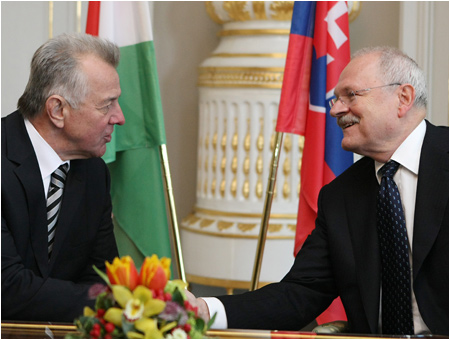
Slovak President Ivan Gašparovič said he was pleased to see the president of a neighbouring country arrive for an official visit to Slovakia and highlighted its friendly atmosphere. Hungarian President Pál Schmitt reiterated that “the Danube as our common border should unite, rather than divide, us.”
Both presidents noted harmony in opinions on majority of the issues discussed, adding that those issues where Slovakia’s and Hungary’s opinions diverge were not left aside. For the most part, the pragmatic and constructive discussion revolved around the necessary focus on fostering economic and trade cooperation which crossed the €4.5 billion mark.
They also addressed the controversial legislative issues in connection with Hungary’s Dual Citizenship Act and the related legislation in Slovakia. Ivan Gašparovič stressed that “creating an institutional link between the citizens of the Slovak and Hungarian nationality across the border is not good. It is unacceptable. Creating such a relationship between a foreign national and a new country, making it possible to side with one or the other in connection with certain crisis issues in the future, is not good.”
The Hungarian President defended Hungary’s Dual Citizenship Act, saying that the Slovak legislation penalizes the Slovak citizens of Hungarian nationality for being granted Hungarian citizenship, which automatically deprives them of their Slovak citizenship. According to Schmitt, Hungary’s intention is only to “strengthen the moral integrity of the Hungarian nation.” Ivan Gašparovič said that, if it was up to him, the best thing would be to repeal both controversial laws.
When asked by a journalist about the granting of voting rights to Hungarian compatriots who became Hungarian citizens in this manner, Hungary’s highest representative said that the Parliament would deal with an amendment to the Hungarian Constitution as late as in the spring.
Pál Schmitt simultaneously stressed Hungary’s position concerning the Slovak language law and that Budapest was concerned about sanctions for its possible violations. “We hope the issue of language law is not concluded with finality yet,” he said.
During their discussion in the Presidential Palace, both partners directly and constructively tackled the Roma issue. They agreed that the countries had been addressing this issue for decades. “Therefore, I was pleased to see Hungary rigorously presenting this issue as one concerning the entire Europe,” Gašparovič commented on the agenda of the Hungarian Presidency of the EU. He also praised the fact that joint Slovak-Hungarian commissions had resumed their work towards finding compromise solutions “in areas where we have not reached unity and consensus so far.”
In connection with the rights of national minorities Ivan Gašparovič said that all national minorities in Slovakia enjoyed and were guaranteed all constitutional and legal rights on equal footing with other citizens of the Slovak Republic. At the same time, however, he added that “except for loyalty towards the country they live in, we do not want anything else from minorities.”
Ivan Gašparovič suggested to the Hungarian President that the tradition of joint discussions with university students in both countries be restored. This approach worked well in the past because young people are open-minded in their views of the future and do not consider historical revisions, which fall short of bringing a positive shift, a priority.